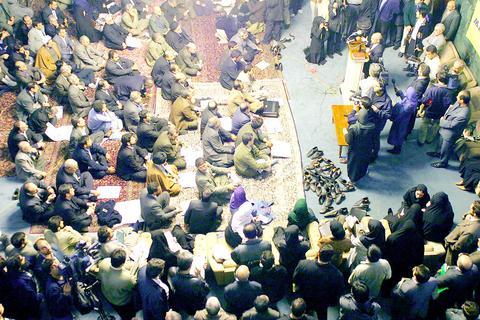Iran's president told 27 provincial governors who threatened to resign that he may join their walkout unless conservatives reverse a decision barring pro-reform candidates from elections, a government official said.
President Mohammad Khatami, meeting with the governors, condemned the Guardian Council's decision to bar more than 3,000 candidates from taking part in Feb. 20 elections.
The ban includes some 80 sitting lawmakers, and legislators say all of them are reformist. State broadcast media, which are controlled by hard-liners, say the candidates lacked "the necessary legal qualifications."

PHOTO: EPA
A senior official in the president's office said on Tuesday that he heard Khatami tell the governors that he supported their decision and it was possible that he might join them.
"Either we stay on all together or we leave all together," the official quoted Khatami as telling the governors.
Iranian state television, which the hard-liners control, quoted the reformist president as telling the governors: "What happened during the process of disqualifying individuals was not right."
The report quoted Khatami as saying: "I believe that all of us will have to be strong. If one day we were asked to leave the arena, then all of us must do so."
Government spokesman Abdollah Ramezanzadeh said on his Web site on Tuesday that several senior government officials believe the decision will impede their work. Vice President Mohammad Sattarifar also said on Monday that if the government can't protect "legitimate freedoms" including fair elections, it might step down.
Iran's supreme leader, Ayatollah Ali Khamenei, has pledged to intervene if the crisis is not resolved, but has urged complainants to use legal channels to pursue their case. Disqualified candidates have the right to appeal.
Several reformist lawmakers blamed Khamenei himself for the disqualifications by the council, an unelected constitutional watchdog. About 8,200 people filed papers to run for the 290-seat legislature.
"Guardian Council members are hand-picked by him. It's not logical to think council members make decisions without their leader's support," said Ali Tajernia, one of the legislators barred from running again. Another reformist lawmaker, Shahrbanou Amani, also blamed Khamenei.
Some reformists have threatened to boycott the elections if the disqualifications stand.
The largest reformist party, the Islamic Iran Participation Front, issued a statement on Tuesday saying the disqualifications would lead to a "sham parliament."
"Disqualifications deny the people their constitutional right to choose and be chosen," the statement said.
The US and the EU have also warned the disqualifications would jeopardize the Iranian parliament's legitimacy.
For a third consecutive day on Tuesday, about 90 legislators staged a sit-in in the lobby of the parliament building. The lawmakers took off their shoes and sat on the floor while taking turns to address the media from a podium.
The elections are seen as a crucial test for Iran's reformers, whose popularity has waned because of their perceived failure to deliver on promises of liberalization. Hard-liners long have used their control of unelected bodies -- such as the judiciary and the Guardian Council -- to block reform.

PRECARIOUS RELATIONS: Commentators in Saudi Arabia accuse the UAE of growing too bold, backing forces at odds with Saudi interests in various conflicts A Saudi Arabian media campaign targeting the United Arab Emirates (UAE) has deepened the Gulf’s worst row in years, stoking fears of a damaging fall-out in the financial heart of the Middle East. Fiery accusations of rights abuses and betrayal have circulated for weeks in state-run and social media after a brief conflict in Yemen, where Saudi airstrikes quelled an offensive by UAE-backed separatists. The United Arab Emirates is “investing in chaos and supporting secessionists” from Libya to Yemen and the Horn of Africa, Saudi Arabia’s al-Ekhbariya TV charged in a report this week. Such invective has been unheard of

‘TERRORIST ATTACK’: The convoy of Brigadier General Hamdi Shukri resulted in the ‘martyrdom of five of our armed forces,’ the Presidential Leadership Council said A blast targeting the convoy of a Saudi Arabian-backed armed group killed five in Yemen’s southern city of Aden and injured the commander of the government-allied unit, officials said on Wednesday. “The treacherous terrorist attack targeting the convoy of Brigadier General Hamdi Shukri, commander of the Second Giants Brigade, resulted in the martyrdom of five of our armed forces heroes and the injury of three others,” Yemen’s Saudi Arabia-backed Presidential Leadership Council said in a statement published by Yemeni news agency Saba. A security source told reporters that a car bomb on the side of the road in the Ja’awla area in

US President Donald Trump on Saturday warned Canada that if it concludes a trade deal with China, he would impose a 100 percent tariff on all goods coming over the border. Relations between the US and its northern neighbor have been rocky since Trump returned to the White House a year ago, with spats over trade and Canadian Prime Minister Mark Carney decrying a “rupture” in the US-led global order. During a visit to Beijing earlier this month, Carney hailed a “new strategic partnership” with China that resulted in a “preliminary, but landmark trade agreement” to reduce tariffs — but

SCAM CLAMPDOWN: About 130 South Korean scam suspects have been sent home since October last year, and 60 more are still waiting for repatriation Dozens of South Koreans allegedly involved in online scams in Cambodia were yesterday returned to South Korea to face investigations in what was the largest group repatriation of Korean criminal suspects from abroad. The 73 South Korean suspects allegedly scammed fellow Koreans out of 48.6 billion won (US$33 million), South Korea said. Upon arrival in South Korea’s Incheon International Airport aboard a chartered plane, the suspects — 65 men and eight women — were sent to police stations. Local TV footage showed the suspects, in handcuffs and wearing masks, being escorted by police officers and boarding buses. They were among about 260 South